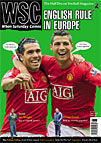 Cameron Carter reviews the month's best and worst TV
Cameron Carter reviews the month's best and worst TV
There are many different levels of interview, ranging in difficulty from the longish ones carried out at Camp X-Ray to the up-tempo drivel exchanged between Fearne Cotton and cornered celebrities. From a programme billed on the BBC website as bringing us “fresh and incisive journalism that gets under the skin of sport”, we might reasonably expect something halfway between. Unfortunately, Inside Sport (BBC1) was invited into the home of Birmingham City’s multi-millionaire co-owner, David Sullivan, and immediately went Hello! magazine on our arse.
Tony Livesey, previously an employee of Sullivan at the Daily Sport and now really slumming it at The Daily Mail, may have left his house that morning as a fresh and incisive journalist, but by the time he reached Sullivan Mansion he was a cub scout being shown round the richest man in the village’s house. On the verandah, above an unobtrusive soundtrack of classical strings, Livesey incisively murmured that his host was a very private man. In the custom-made bowling-alley, he trenchantly heeded Sullivan’s highest ever bowling score (266 incidentally, with nine straight strikes). In the games room, he penetratingly remarked on Sullivan’s boxing prowess while the late middle-aged sex-shop magnate brawled with a flaccid punchbag.
Sullivan apparently underwent a much more difficult interview when police routinely questioned him about financial irregularities at his club. “You felt you’d been psychologically raped”, he told Livesey, the latter nodding sensitively in the hope he might be invited back sometime for a sleepover. The real horror of Sullivan’s situation became apparent when he showed us his cabaret lounge and named the most memorable singer to perform there: Rick Astley. Sullivan and his best mates of that evening eating braised haunch of venison while Astley shuffles about singing “Together Forever” is not an image that endears one to this life. Perhaps Livesey’s approach was the correct one, it is surely more humane to be gentle with people as frail as this.